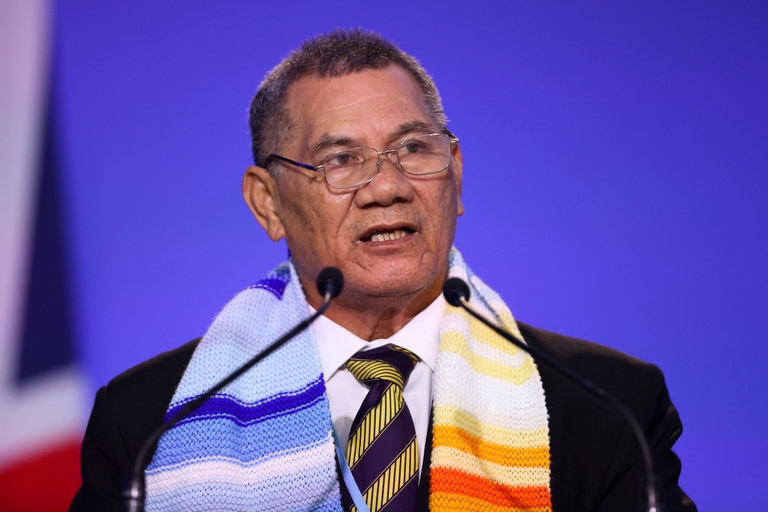
A report by Ember explains that in 2025 electricity generation from renewables (solar, wind and hydropower) surpassed that from fossil fuel sources.
The small Pacific island of Tuvalu is highly vulnerable to rising sea levels. At COP27, it demanded strict targets for the transition from fossil fuels.
Tuvalu has become the first country in the world to use the United Nations climate conferences to demand an international fossil fuel non-proliferation treaty, which would gradually eliminate the use of coal, oil, and gas.
The small Pacific island nation, which is extremely vulnerable to the rise in sea levels caused by global warming, followed in the footsteps of Vanuatu, another Pacific island that demanded a fossil fuel non-proliferation treaty back in 2015, after cyclone Pam destroyed 96 per cent of the island’s crops.
Representatives for Tuvalu did not travel to Egypt to take part in COP27 in person, but Prime Minister Kausea Natano, addressing the conference remotely, said that “the warming seas are starting to swallow our lands, inch by inch. But the world’s addiction to oil, gas and coal can’t sink our dreams under the waves”.
Climate activists responded favourably to Tuvalu’s request and decried the actions of major polluters, including the US and China, who made sure that the use of fossil fuels was not in danger during the talks at COP26 in Glasgow last year. During the previous conference, participating countries agreed for the first time to “gradually reduce” the use of coal, while gas and oil were not even mentioned.
“We, therefore, unite with a hundred Nobel peace prize laureates and thousands of scientists worldwide and urge world leaders to join the fossil fuel non-proliferation treaty to manage a just transition away from fossil fuels,” Natano concluded.
“Countries like Tuvalu are the ones on the frontlines, they know they can’t just give in to the vested interests of the fossil fuel companies,” said Harjeet Singh, head of global political strategy at Climate Action Network International. “We know who the victims of the climate crisis are and we know who the perpetrators are but we don’t ever discuss fossil fuels, the elephant in the room”.
Singh noted that a treaty on fossil fuels, based on the model of the nuclear weapon non-proliferation treaty, must focus on the demand for fossil fuels and thus on extraction, limiting the exploitation of reserves while also setting targets for a fairer transition to renewable energy.
For now, the idea of explicitly accepting the invitation to reduce the use of fossil fuels does not seem to be a priority for the governments gathered in Sharm el Sheikh. The goal of such a treaty would be to give legal substance to the scientific community’s demand to “keep it in the ground”, ceasing the extraction of oil, gas, and coal. These activities are still not regulated, even though the International Energy Agency has warned that no new coal, oil, or gas infrastructure should be built if we are to avoid the most disastrous effects of global warming.
Although no major polluter has thus far considered the request for a new treaty, the suggestion was supported by the Vatican, the World Health Organisation (WHO), and a network of mayors including London mayor Sadiq Khan. Activists hope that support for Pacific island nations will contribute to bringing about a similar momentum to that which led to the historic Paris Agreement, where, for the first time, a 1.5-degree limit for the rise of global average temperatures was set.
Siamo anche su WhatsApp. Segui il canale ufficiale LifeGate per restare aggiornata, aggiornato sulle ultime notizie e sulle nostre attività.
![]()
Quest'opera è distribuita con Licenza Creative Commons Attribuzione - Non commerciale - Non opere derivate 4.0 Internazionale.
A report by Ember explains that in 2025 electricity generation from renewables (solar, wind and hydropower) surpassed that from fossil fuel sources.
The Tyler Prize, considered the “Nobel Prize for the Environment,” has been awarded to Toby Kiers, an American biologist working in Amsterdam.
Belgium is one of the countries most exposed to climate change. Dune–dikes are a solution to curb sea-level rise.
Between October 2024 and September 2025, the average temperature in the Arctic was 1.6 degrees Celsius higher than during the 1991–2020 period.
Undeclared conflicts of interest, paid authors, lack of transparency: one of the most cited studies on glyphosate, published in 2000, has been retracted.
The Copernicus service has released data for the first eleven months of 2025: global warming is set to come close to last year’s record.
The European Council and Parliament have reached an agreement on the European Commission’s proposal to deregulate new GMOs. But farming, organic agriculture, and environmental organizations are calling for it to be stopped.
The world’s second-largest producer has taken a historic decision. However, farms will have until 2034 to shut down.
A Greenpeace report denounces Russia’s political and economic model: a nexus of extractivism, authoritarianism and war that is destroying the environment, with serious repercussions for the global ecosystem.









